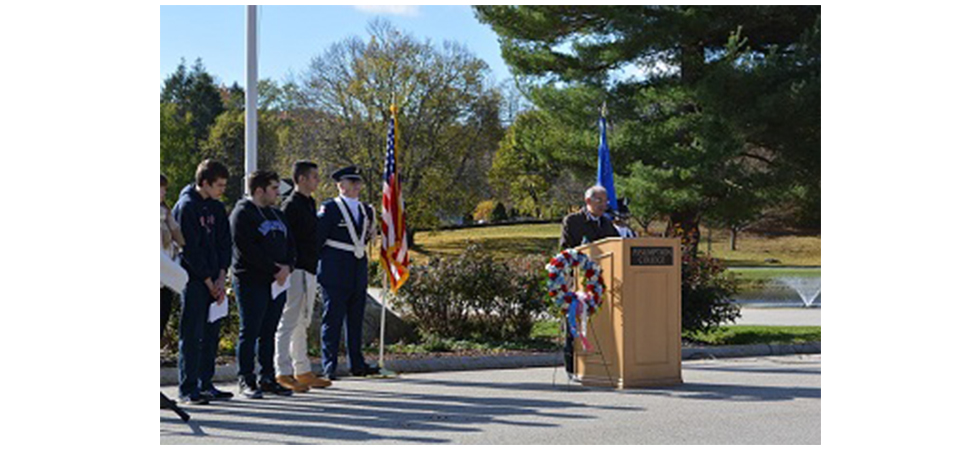Recognizing Veterans for their Selfless Service

In observance of Veterans Day, Assumption recognized and honored the contributions of men and women who have served, or are currently serving, in the U.S. Armed Forces with a brief ceremony and alumnus speaker.
“Assumption’s observance of Veterans Day recognizes those in our community who have served and provides an opportunity for us to pause and reflect upon those who risked their lives for our nation,” said Francesco C. Cesareo, Ph.D., president of Assumption University. “May we as a community never forget their courage, bravery and undying devotion to protect this great nation.”
During the ceremony held at the base of the flagpole near the front entrance of campus, members of the Worcester Public School’s South High Junior ROTC Presented the Colors, then Assumption’s VOCE (Latin for “voices”) sang the National Anthem. Guest speaker Major General (Ret.) Robert G. Catalanotti ’80, HD ’15, a member of the Board of Trustees, spoke of his many years of military service, as well as his family’s dedication and commitment to their country: his son and daughter-in-law are both serving.
Following Major General Catalanotti’s remarks, those service veterans in the audience—which included Assumption students, faculty, and staff—were recognized for their service and given an Assumption Veterans Challenge Coin.
“It was just moving and powerful,” said Christina Teahan ‘18. “It really brought forward that we don’t appreciate nearly as many people as I think we should. We didn’t realize that some of our campus police actually served so it was nice to see them walk up and get the Assumption Veterans Challenge Coin. It just made me think of my grandfather, my dad, my friend and family who are serving and have served in the past.”
Later that evening, U.S. Navy Commander Aaron K. Ayers ’98 encouraged a standing-room only audience to connect with veterans and service members in his talk, “Don’t Just Thank Me For My Service.”
“Ultimately, Veterans Day is not about the parades and ceremonies,” he said. “Veterans Day is about remembering and honoring … The parades and the ceremonies just facilitate that conversation. Veterans Day should also be about connecting veterans with the population they took an oath to defend.”
Commander Ayers, who joined the Navy after graduating from Assumption with a philosophy degree, added that he believes as a nation, we have fallen short in connecting veterans with those who have not served, mostly due to the current size of the military. Ayers cited that “during World War II, 12 percent of the population were in uniform,” but today, it’s less than one percent, causing a divide between veterans and the public. Ayers said that one way people try to bridge that gap is by acknowledging veterans and those on active duty by saying “Thank You For Your Service,” something that makes Ayers uncomfortable.
“I have been thanked a number of times for my service and I never know how to respond,” he said. “I think the reason it makes me uncomfortable is because each time they say it, it ends the conversation … While I and others appreciate the acknowledgement and intention of you thanking us for our service, I would ask you for more. Engage the veteran or service member in a conversation. Display that curiosity as a way to connect.”
For the last 19 years, Ayers—whose own curiosity and eagerness to experience the world led to his decision to enroll in the military—has served on two ships, completed four shore tours, moved around the country 10 times, and has been back to graduate school twice (he has an MBA from Boston College and a Master of National Security Studies from the Naval War College). He currently serves as deputy project support manager for the COLUMBIA Class Submarine Program Office in Washington, D.C.
Ayers said that the public could learn a number of valuable lessons from veterans and their stories.
“Wearing a uniform is a seminal experience in one’s life… most would welcome the opportunity to reflect upon that, think about old friends, and share their experience with others,” he said. “Next time, in addition to thanking a veteran for their service, talk to them. Ask them where they are from, what job they do or did, ask them why they joined. Each one will have their own unique story. Ask them what their time in uniform taught them, or how it changed them or how it forced them to mature. Attempt to connect with them. You’ll have a better appreciation of those that wear the uniform and at the same time they’ll have the opportunity to not feel so separated from the community.”
